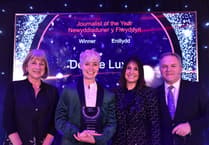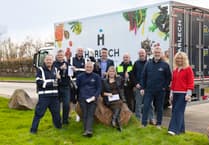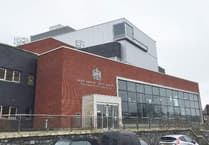A football pundit from Harlech is supporting a campaign to donate blood after she and her family found themselves in desperate need of transfusions not once, but twice.
S4C’s Sgorio football reporter Nicky John understands the benefits of donating after receiving a lifesaving blood transfusion following the birth of her son Sam. The mother-of-two from Harlech had a further encounter with blood transfusions when her daughter Emi was diagnosed with cancer.
In March 2022, baby Emi was diagnosed at just 13 months old with a type of kidney cancer. She received 12 months of chemotherapy and underwent a lengthy operation. Fortunately, thanks to the treatment received, Emi went on to make a full recovery.

Nicky said: “You never think it’s going to be you or your child, but what our family’s experience has established to me is just how vital it is to give blood if you’re able to do so. It’s difficult to put into words what a difference you’re making.
“Having received a transfusion myself, I’m unfortunately not allowed to donate blood anymore. However, I hope that by sharing our story, if I can convince just one more person to go and give blood, then I will have helped in a tiny way. It really can be the difference between life and death, and I couldn’t be more grateful. The support we’ve received from the local community and football fans across Wales during the last 18 months is something I will never forget.”
Speaking of Emi’s treatment and the campaign’s success, Alan Prosser, Welsh Blood Service Director, said: “Emi’s story really demonstrates how important donating blood and platelets can be. It’s why having the support of the FAW, the leagues, and their fans has been critical in helping us highlight the need for more donors. The campaign has exceeded all our expectations and continues to grow, with nearly 70 clubs now participating.
“Our challenge is to recruit 11,000 new donors each year, and we’re hoping by continuing to promote such a good cause, the campaign will continue to help patients in need, like Emi, for years to come.”
Emi’s treatment was successful, but for some blood cancer patients, their only hope of recovery is to receive a bone marrow transplant.
Alan continued: “Each year, the Service aims to recruit 4,000 17 to 30-year-olds to join the Welsh Bone Marrow Donor Registry and help improve outcomes for blood cancer patients. There are two ways to join, by asking to join when donating blood or by requesting a swab kit through our website. The kits are delivered right to your door, making joining easier than ever before.”
Three thousand patients’ lives have potentially been saved across Wales thanks to football fans across local communities donating blood through an ongoing campaign between the Football Association of Wales (FAW) and the Welsh Blood Service.
The ‘Blood, Sweat and Cheers’ campaign launched in November 2020 encourages clubs, fans and local communities from across the domestic leagues to support patients in need by highlighting the importance of donating blood, platelets and bone marrow.
FAW CEO and blood donor, Noel Mooney, who recently teamed up with four colleagues to give blood and mark the campaign’s third anniversary said: “In each community across Cymru there are people whose lives have been saved or improved thanks to donations, and we continue to call on football fans to get involved and become lifesaving champions.
“The Welsh Blood Service is our first community partner for the JD Cymru Leagues and Genero Adran Leagues, and we’re delighted to have made and retained such an important signing. Football really does save lives!”
Visit www.wbs.wales/football today to help someone in need like Emi and find out more about the ‘Blood, Sweat and Cheers’ campaign.
• Anyone aged between 17 and 66, who weighs over 50 kg (7st 12lb) can become a blood donor but there are height and weight restrictions for females under 20 years old.
• WBS collects three types of donation: whole blood, platelets and bone marrow.
• WBS is responsible for collecting around 100,000 blood donations during a typical year to support 19 hospitals across the whole of Wales.
• All blood donations are tested for: HIV (the aids virus); Hepatitis B; Hepatitis C; Hepatitis E; HTLV (Human T Lymphotropic Virus) and Syphilis





Comments
This article has no comments yet. Be the first to leave a comment.